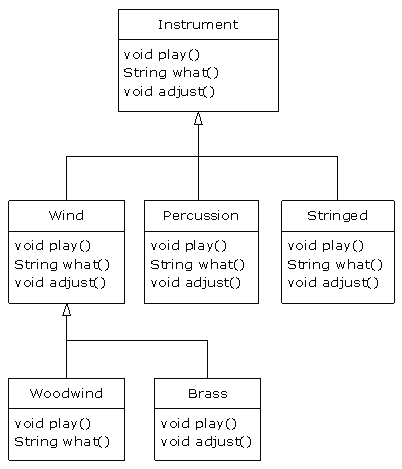Extensibility
Now let’s return to the musical instrument example. Because of polymorphism, you can add as many new types as you want to the system without changing the tune( ) method. In a well-designed OOP program, most or all of your methods will follow the model of tune( ) and communicate only with the base-class interface. Such a program is extensible because you can add new functionality by inheriting new data types from the common base class. The methods that manipulate the base-class interface will not need to be changed at all to accommodate the new classes.
Consider what happens if you take the instrument example and add more methods in the base class and a number of new classes. Here’s the diagram:

All these new classes work correctly with the old, unchanged tune( ) method. Even if tune( ) is in a separate file and new methods are added to the interface of Instrument, tune( ) will still work correctly, even without recompiling it. Here is the implementation of the diagram:
//: c07:music3:Music3.java
// An extensible program.
package c07.music3;
import com.bruceeckel.simpletest.*;
import c07.music.Note;
class Instrument {
void play(Note n) {
System.out.println("Instrument.play() " + n);
}
String what() { return "Instrument"; }
void adjust() {}
}
class Wind extends Instrument {
void play(Note n) {
System.out.println("Wind.play() " + n);
}
String what() { return "Wind"; }
void adjust() {}
}
class Percussion extends Instrument {
void play(Note n) {
System.out.println("Percussion.play() " + n);
}
String what() { return "Percussion"; }
void adjust() {}
}
class Stringed extends Instrument {
void play(Note n) {
System.out.println("Stringed.play() " + n);
}
String what() { return "Stringed"; }
void adjust() {}
}
class Brass extends Wind {
void play(Note n) {
System.out.println("Brass.play() " + n);
}
void adjust() {
System.out.println("Brass.adjust()");
}
}
class Woodwind extends Wind {
void play(Note n) {
System.out.println("Woodwind.play() " + n);
}
String what() { return "Woodwind"; }
}
public class Music3 {
private static Test monitor = new Test();
// Doesn't care about type, so new types
// added to the system still work right:
public static void tune(Instrument i) {
// ...
i.play(Note.MIDDLE_C);
}
public static void tuneAll(Instrument[] e) {
for(int i = 0; i < e.length; i++)
tune(e[i]);
}
public static void main(String[] args) {
// Upcasting during addition to the array:
Instrument[] orchestra = {
new Wind(),
new Percussion(),
new Stringed(),
new Brass(),
new Woodwind()
};
tuneAll(orchestra);
monitor.expect(new String[] {
"Wind.play() Middle C",
"Percussion.play() Middle C",
"Stringed.play() Middle C",
"Brass.play() Middle C",
"Woodwind.play() Middle C"
});
}
} ///:~
The new methods are what( ), which returns a String reference with a description of the class, and adjust( ), which provides some way to adjust each instrument.
In main( ), when you place something inside the orchestra array, you automatically upcast to Instrument.
You can see that the tune( ) method is blissfully ignorant of all the code changes that have happened around it, and yet it works correctly. This is exactly what polymorphism is supposed to provide. Changes in your code don’t cause damage to parts of the program that should not be affected. Put another way, polymorphism is an important technique for the programmer to “separate the things that change from the things that stay the same.”
